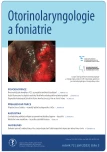Rhinosinusitis as a complication of FESS: is antibiotic prophylaxis beneficial?
Authors:
Z. Jeřábková; P. Schalek
; J. Fuksa
; Martin Chovanec
Authors‘ workplace:
Otorinolaryngologická klinika 3. LF UK a FN Královské Vinohrady, Praha
Published in:
Otorinolaryngol Foniatr, 72, 2023, No. 3, pp. 121-126.
Category:
Original Article
doi:
https://doi.org/10.48095/ccorl2023121
Overview
Introduction: One of the most common complications of functional endoscopic sinus surgery (FESS) is purulent rhinosinusitis, which often requires antibiotic (ATB) therapy. The aim of our study was to determine whether complications requiring ATB administration are so frequent and severe that antibiotic prophylaxis would be beneficial. Our next question is whether a complicated postoperative course with ATB therapy leads to early recurrence and thus reoperation. Material and methods: This is a retrospective study of 370 patients undergoing FESS at the Department of Otorhinolaryngology, University Hospital Královské Vinohrady, 3rd Faculty of Medicine, Charles University, between 2012 and 2018 for chronic rhinosinusitis with nasal polyps (CRSwNP). We investigated the incidence of postoperative complications, the reason for postoperative ATB therapy and the rate of revision FESS within 3 years in patients with complicated and uncomplicated healing. In the study cohort, we observed complications in 35 cases (9.5%); the most common complication was postoperative purulent rhinosinusitis, which was observed in 23 patients (6.2%). ATB therapy was indicated in 37 (10%) patients, most often because of postoperative purulent rhinosinusitis. Results: We did not show that patients with complicated healing reached revision surgery more often (P = 0.3883). Our findings are consistent with data from the available literature, according to which patients do not benefit significantly from the administration of ATB prophylaxis. Conclusion: ATB prophylaxis is not universally indicated in FESS. Postoperative suppurative inflammation is not associated with early recurrence requiring revision surgery.
Keywords:
Antibiotic prophylaxis – rhinosinusitis – FESS complications – revision procedure
Sources
1. Kartush AG, Schumacher JK, Shah R et al. Biologic Agents for the Treatment of Chronic Rhinosinusitis With Nasal Polyps. Am J Rhinol Allergy 2019; 33(2): 203–211. Doi: 10.1177/ 1945892418814768.
2. Saleh AM, Torres KM, Murad MH et al. Prophylactic perioperative antibiotic use in endoscopic sinus surgery: a systematic review and meta-analysis. Otolaryngol Head Neck Surg 2012; 146(4): 533–538. Doi: 10.1177/ 0194599811434117.
3. Fang CH, Fastenberg JH, Fried MP et al. Antibiotic use patterns in endoscopic sinus surgery: a survey of the American Rhinologic Society membership. Int Forum Allergy Rhinol 2018; 8(4): 522–529. Doi: 10.1002/ alr.22085.
4. Wang JJ, Chen CY, Liang KL et al. Predictors of nasal bacterial culture rates in patients with chronic rhinosinusitis. Eur J Clin Microbiol Infect Dis 2020; 39(4): 711–716. Doi: 10.1007/ s100 96-019-03775-w.
5. Mantovani K, Bisanha AA, Demarco RC et al. Maxillary sinuses microbiology from patients with chronic rhinosinusitis. Braz J Otorhinolaryngol 2010; 76(5): 548–551. Doi: 10.1590/ S1808-869 42010000500002.
6. Zhang Z, Palmer JN, Morales KH et al. Culture-inappropriate antibiotic therapy decreases quality of life improvement after sinus surgery. Int Forum Allergy Rhinol 2014; 4(5): 403–410. Doi: 10.1002/ alr.21277.
7. Khanna A, Sama A. Managing Complications and Revisions in Sinus Surgery. Current Otorhinolaryngology Reports 2019; 7(1): 79–86. Doi: 10.1007/ s40136-019-00231-3.
8. Wu AW, Ting JY, Platt MP et al. Factors affecting time to revision sinus surgery for nasal polyps: a 25-year experience. Laryngoscope 2014; 124(1): 29–33. Doi: 10.1002/ lary.24213.
9. Shen PH, Weitzel EK, Lai JT et al. Retrospective study of full-house functional endoscopic sinus surgery for revision endoscopic sinus surgery. Int Forum Allergy Rhinol 2011; 1(6): 498–503. Doi: 10.1002/ alr.20081.
10. Koizumi M, Suzuki S, Matsui H et al. Trends in complications after functional endoscopic sinus surgery in Japan: A comparison with a previous study (2007-2013vs. 2013-2017). Auris Nasus Larynx 2020; 47(5): 814–819. Doi: 10.1016/ j.anl.2020.04.003.
11. Tan BK, Chandra RK. Postoperative prevention and treatment of complications after sinus surgery. Otolaryngol Clin North Am 2010; 43(4): 769–779. Doi: 10.1016/ j.otc.2010.04.004.
12. Koptíková L, Balatková Z, Motyka O et al. Perioperační komplikace FESS na ORL oddělení Nemocnice České Budějovice, a.s., v letech 2000––2017. Otorinolaryngol Foniatr 2020; 69(1): 11–16.
13. Jiang RS, Liang KL, Yang KY et al. Postoperative antibiotic care after functional endoscopic sinus surgery. Am J Rhinol 2008; 22(6): 608–612. Doi: 10.2500/ ajr.2008.22.3241.
14. Jorissen M. Postoperative care following endoscopic sinus surgery. Rhinology 2004; 42(3): 114–120.
15. Patel PN, Jayawardena ADL, Walden RL et al. Evidence-Based Use of Perioperative Antibiotics in Otolaryngology. Otolaryngol Head Neck Surg 2018; 158(5): 783–800. Doi: 10.1177/ 0194599817753610.
16. Chandra RK, Conley DB, Kern RC. Prophylactic i.v. antibiotics in functional endoscopic sinus surgery: trends and attitudes of the American Rhinologic Society membership. Am J Rhinol Allergy 2009; 23(4): 448–450. Doi: 10.2500/ ajra.2009.23.3349.
17. Martinez JL. General principles of antibiotic resistance in bacteria. Drug Discov Today Technol 2014; 11 : 33–39. Doi: 10.1016/ j.ddtec.2014.02.001.
18. Marchioni D, Alicandri-Ciufelli M, Mattioli F et al. Middle turbinate preservation versus middle turbinate resection in endoscopic surgical treatment of nasal polyposis. Acta Otolaryngol 2008; 128(9): 1019–1026. Doi: 10.1080/ 00016480701827541.
Labels
Audiology Paediatric ENT ENT (Otorhinolaryngology)Article was published in
Otorhinolaryngology and Phoniatrics

2023 Issue 3
Most read in this issue
- Oesophageal and gastric corrosions – diagnostic and therapeutic approach
- Cervicofacial subcutaneous emphysema after routine dental hygiene procedure – a case report
- Rhinosinusitis as a complication of FESS: is antibiotic prophylaxis beneficial?
- Diagnosis of heterotopic gastric mucosa of the upper esophagus and its effect on the laryngeal mucosa
